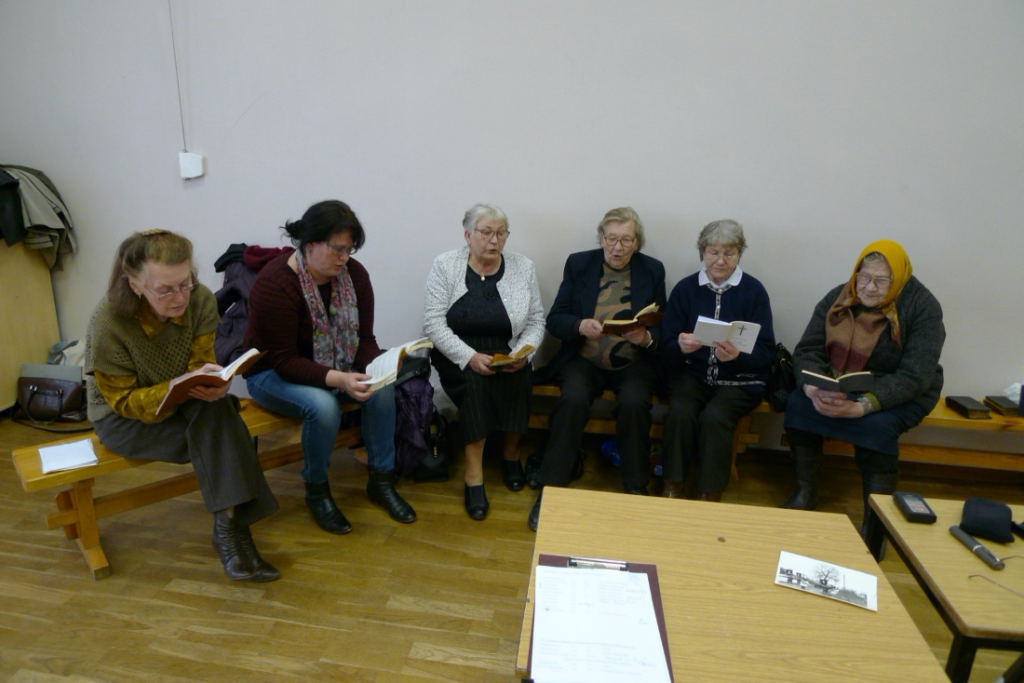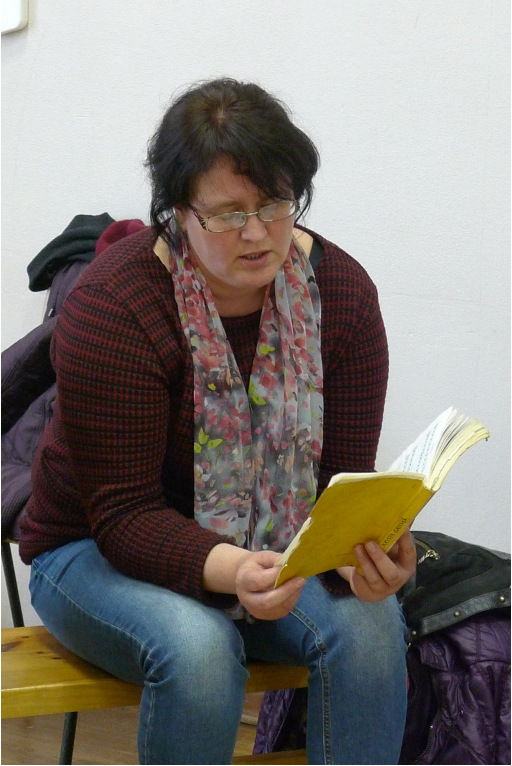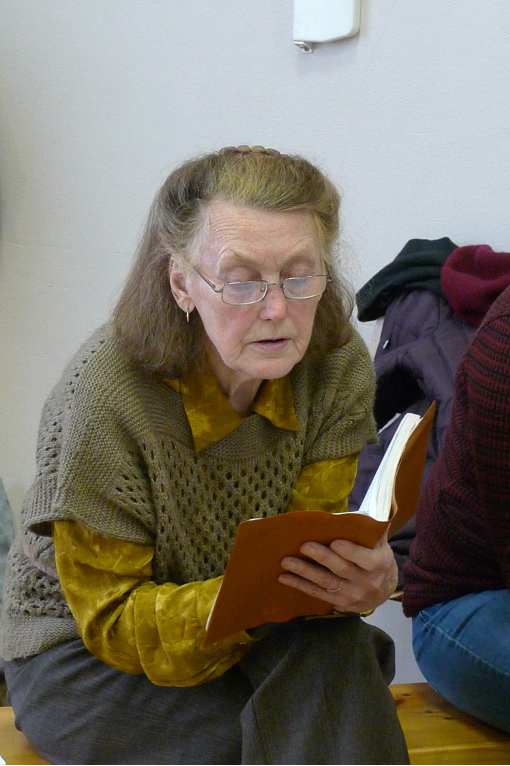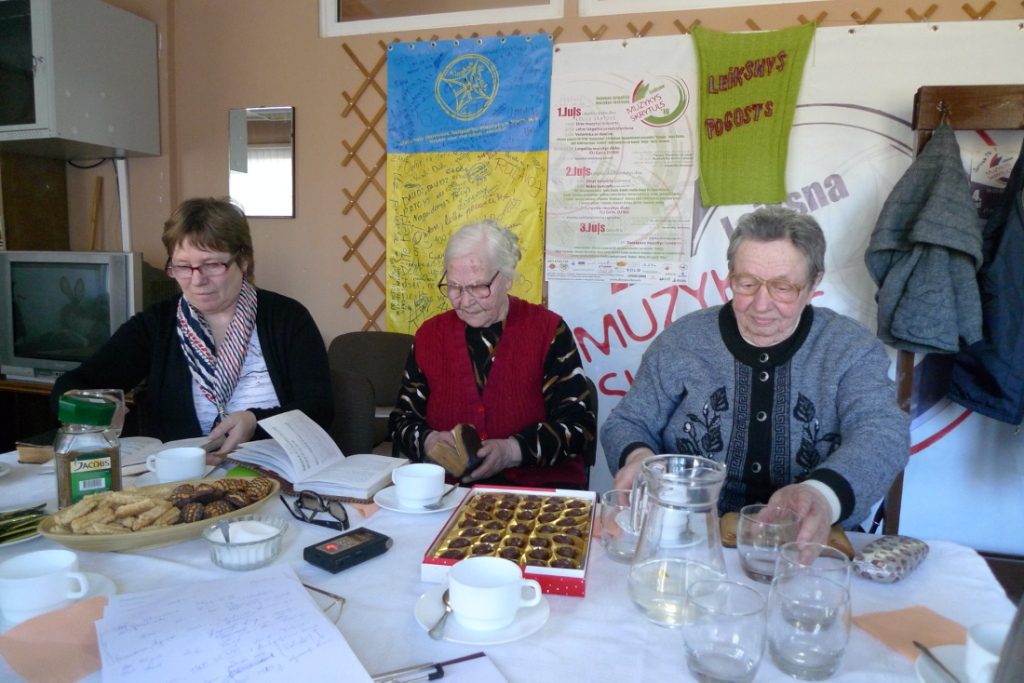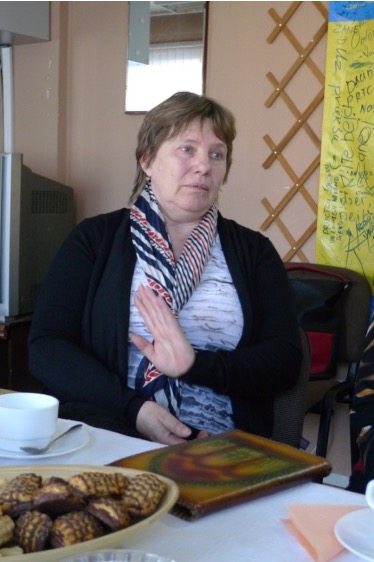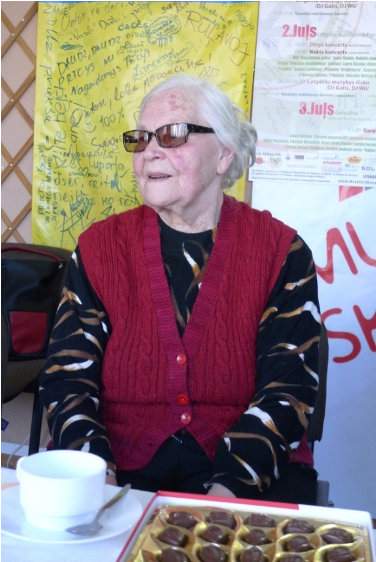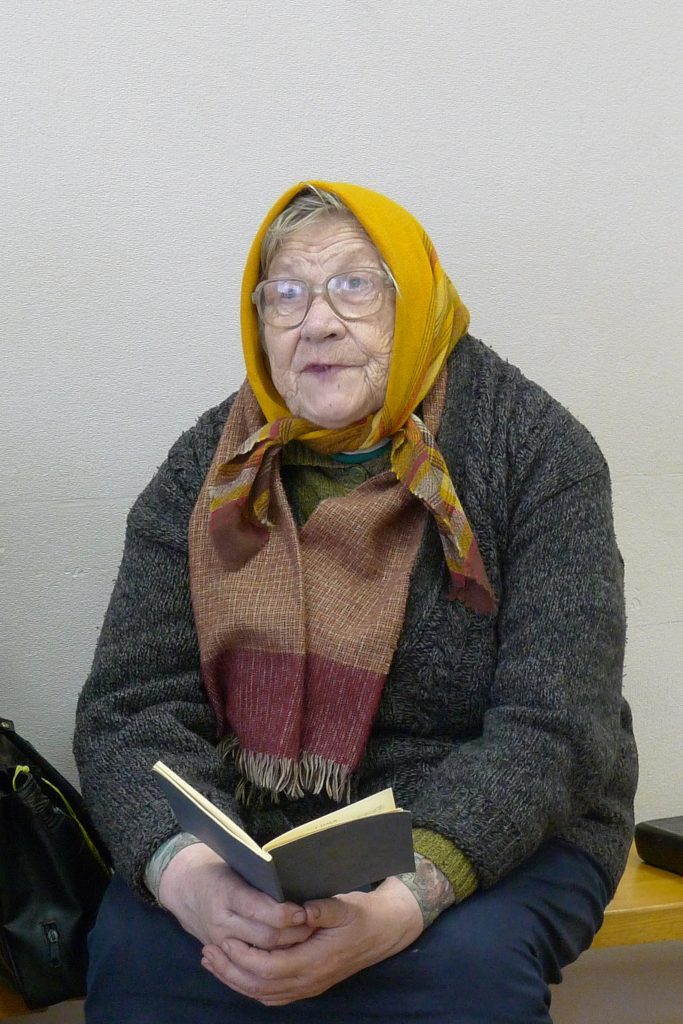Author:
Martin Boiko
Social practices, rituals and festive events
Title
Performance of the Office of the Dead (saļmi) in the Vabole and Līksna parishes (2017)
Salmas (Vabole), saļmis (Līksna).
Most frequently, the Office for the Dead is simply called salmas/saļmis.
Sometimes, when it is important to distinguish it from the so-called "mozos (small/minor) salmas" - the seven psalms of repentance, which are also in the singers' repertoire - the distinguisher "lelos" (big/major) is used.
Geography
The parish of Vabole and the parish of Līksna (in the 20s and 30s of the 20 th century, they together formed the parish of Līksna).
In the narrow sense, the element “belongs to“ small so-called musical practice Communities ”— Līksna psalm singers and Vabole psalm singers.
They are open communities in the sense that, by observing the practice in question: performing the office for the dead, the singers differ from one occasion to the other in terms of numbers and persons involved. Moreover, there is also a possibility that other people that are present can spontaneously join in. In both parishes, there are approximately ten people in the communities.
In the case of vaboles parish, this Community coincides with the ethnographic ensemble “Vabalis”. In a broad sense, the element refers to those parish people in general. The performance of the dead ofīcija is requested almost always when one of these parish residents is dead.
Importance in Community Life
The Office of the Dead is an integral part of the funeral process of the Vabole and Līksna parishes. In 2016, 26 dead were buried in the Vabole parish cemetery. For 16 of them, the Office of the Dead was performed.
It should be noted that 17 of these people died within the parish (the remaining were brought in for burial from other places). Thus, the number of performances of the Office of the Dead almost coincides with the number of the people who died in the parish.
Also in the Līksna parish in 2016, around half of the 15 people who died in the parish received an Office of the Dead. It is evident that the Office of the Dead holds a stable and important role amongst the death-related traditions in Līksna and Vabole parishes: the singers are invited to be with the majority of the departed.
Looking back at the past, it can be said quite securely that for most of the dead that have been buried int he Vabole and Līksna cemeteries, the Office of the Dead has been held. It is a non-written law of parish life that the Office of the Dead is performed if death occurs, and this tradition is still strongly held by today.
Activities
The existence of the practice is based on the deep-rooted belief held by the singers and families that the dead souls need prayer, thereby relieving their suffering in the purgatory: 'the dead must be prayed for." The Office of the Dead is a traditional, effective form of prayer — a "tool" for releiving the suffering of the souls of the departed family members.
The Office of the Dead is executed in Latgalian language and exists as a semi-orally inherited, folklorized phenomenon, which is performed mainly at home and usually without a priest's participation, like a folk song, without any external organisation. For two centuries and continuing today, the Office of the Dead keeps its very important place in this repertoire.
Beliefs, Rituals, Unwritten Rules
With the Office of the Dead, there is a belief that the appearance of the dead in a dream means that he is asking to be prayed for, that is to say, to hold Office of the Dead.
Inheritance and transmission
The music of the Office of the Dead exists in an oral tradition: the range of melodies, their sequences, the singing skills are inherited directly – the singers engage in its performances and sing along, gradually accumulating experience (there is no training form such as practice, instructing, special exercise or similar).
The text of the Office of the Dead is given in the books. Its first form is a prayer book published in 1786, entitled “Nabożeństwo ku czci y chwale Boga w Trójcy Swiętey Jedynego” (prayer book for the glory of God of the Trinity).
The Latgalian version of the Office of the Dead published in this edition through re-publishing in many later Latgalian prayers books has reached the modern day.
History
The Office of the Dead is a type of hourly prayer. It was created around year 800 and was executed as an exequy (funeral liturgy) on the funeral day, as well as during the wake of the dead.
In the monasteries, the 10th and 11th centuries introduced the habit of performing the Office of the Dead as a daily prayer. Following the decision of the Council of Trent, in 1568, the obligation to hold it during the Wake was maintained, as well as on 2 November (on the day of all souls) and on the day of the funeral, performed in a choir.
The Office of the Dead has three parts: the vespers, matins and laudes. Over the centuries, the Office of the Dead is known as a prayer held by priests in Latin. At the end of the 18th century, it entered the traditional repertoire of Latgale (also Augšzeme). It was introduced by Jesuit missionaries, who translated the text into Latgalian, included it in prayer books and taught it to people.
At the time when the mass release of the prayer book “Nabożeństwo” came out, which included the Office of the Dead text (1786), Līksna was an important Catholic centre where the Jesuit missionaries were active. This allows the assumption that the introduction of practicing the Office of the Dead here could be dated with the aforementioned time period - the end of the 18th century. By accepting this date as a reference point, this means that the practice of the Office of the Dead in the territory of modern Vabole and Līksna parishes is approximately 230 years old.
In the 19th century and the first half of the 20th century, the singing skill of the Office of the Dead was general – it was fairly uniformly covered by different generations, and the proportion of women-men was more equal (today, the performers of the Office of the Dead are almost always female). The Office of the Dead could be performed by almost every household. There was no special invitation of singers and no habit of thanking the singer with special prizes in cash or gifts.
In the 19th century and in the first half of the 20th century, the Office of the Dead had a much wider functional spectrum in modern Līksna and Vabole parishes.
It was performed: on the occasion of the death, including the death anniversary (when a year since the death of the person has passed); in October/November, for all the late members of the family; as well as on 2 November in the church before the Mass, holding it for all of the dead of the parish.
Today, the three last cases are no longer practised or are rare, but the performance for specific departed is still very strong, which does not alter the fact that there are serious threats.
Today, the skills are concentrated in small, mobile communities centred around a personality who knows the material well. The performance of the Office of the Dead has become a service.
Additional Information
The Office of the Dead is an autonomous ritual, but today most often appears as a part of the broader process of the wake and funeral. In the past, it was also held on 2 November in the church before the Mass, making it an integral part of the Church rituals of 2 November.
Masters
The core of the community of performers of the Office of the Dead of the Vabole parish are members of the “Vabaļis” ensemble:
1. Regīna Vingre (b. 1938),
2. Anna Rubina (b. 1946),
3. Lidija Sparāne (b. 1942),
4. Mairita Stalidzāne (b. 1974),
5. Irēna Limane (b. 1943),
6. Iveta Skrinda (b. 1977),
7. Veronika Stikāne (b. 1948).
However, there are multiple singers outside the ensemble who have been identified as capable of performing the Office of the Dead.
1. Regīna Žukovska (b. 1940),
2. Lidija Orbidāne (b. 1943),
3. Monika Deidule (b. 1924),
4. Leokādija Borovika (b. 1931).
Thus, at least 11 persons are associated with that practice in the Vabole parish.
In the Līksna parish, the work on the application was done with three singers:
1. Sofija Klaucāne (b. 1926),
2. Agnese Brakovska (b. 1943),
3. Marija Pupiņa (b. 1969).
Several more singers are known:
1. Berta Vingre,
2. Agnese Samuša,
3. Stanislava Kevis,
4. Anna Vingre,
5. Veronika Rācene,
6. Eleanora Velika,
7. Olga Jakubovska,
8. Ņina Sarkane.
As a result, the Community of Līksna's Office of the Dead musical practice of approximately 11 persons.
Institutions and Organizations
The Cultural board of the Augšdaugava municipality,
The Vabole parish administration
Vabole culture house,
The Museum of the Skrinda family.
Strengthening the Tradition
The psalm singing practice is performed by the Etnographic ensemble “Vabalis” of the Vabole parish culture house. The municipality of Augšdaugava maintains and supports the existence of an ensemble.
1. Research and documentation, 2018, Skrinda family Museum, VKKF target programme, eur 1500.
2. Establishment of a database, 2019, Museum of Skrinda family, VKKF target programme, eur 1500.
3. Release of sound recordings, 2020, Cultural administration, VKKF programmes, €2000.
4. The restoration of prayers in families every year for all the dead together; the restoration of the tradition, the the Office of the Dead is sung in the church before the Mass on 2 November and during the graveyard memorial day before the Mass. 2019-2022, Līksna Catholic parish. Community resources.
5. Publicity: ensuring the existence and use of practice depictions on the web and in the press. 2019-2022 Cultural Administration. Municipal resources.
6. Photo exhibition of Vabole and Līksna psalm singers. 2019-2020 Museum of the Skrinda family, VKKF target programme, eur 1600.
7. “Psalmi” – CD release, 2022 Vabole parish council, Etnographic ensemble “Vabalis”, 2000 euros.
8. Skill workshops, 2018-2022 The parish council of Vabole. Community and municipal resources.
9. Aid to Etnographic ensemble “Vabalis”, 2018-2022 Daugavpils municipality administration. Municipal budget.
Psalm performance is a process related to the life cycle of a person, the Catholic people invite the singers to perform their ritual events - funeral, prayers for the dead. Today, the Office of the Dead is an integral part of funeral developments in the parish of the surroundings.
The municipality of Augsdaugava local government maintains the activities of the ethnographic ensemble “Vabalis” from its cultural budget, which is, in turn, the keeper of the Office of the Dead tradition in the Community.
From the State, a target grant for the remuneration of the leader of the ensemble.
Continuity/Development
The Skrinda Family Museum will perform local research on the Office of the Dead traditions in the Vabole, Kalupe and Līksna parishes, complement the museum stock with the documents obtained. The database of tradition bearers will be expanded.
The Vabole cultural house will continue the activities of the ethnographic ensemble “Vabalis”, organize events (May singing, etc.), and research and restore traditional ritual clothing of the participants of the ensemble.
The music of the Office of the Dead exists in an oral tradition: the range of melodies, their sequences, the singing skills are inherited directly – the singer engages in its performances and singing with them, gradually accumulating experience as there is no special attempt, instruction, exercise. However, the activities of the performers in the Ethnographic ensemble facilitates the communication of the traditions, complements their experience, so that the practice of performing the Office of the Dead in the next five years in the Vabole and Līksna parishes will be continued mainly by the activities of the ethnographic ensemble “Vabalis”, which will be ensured by the municipality of Augšdaugava.
Preserve the existence of the Office of the Dead in the community of Vabole and Līksna parishes in Community life traditions.
Threats to the Tradition
The existence of the Office of the Dead practice is based on both the singer and the rest of the deep-rooted conviction that the dead souls need prayer to lessen their suffering in the purgatory. This should be borne in mind when dealing with threats.
The threats of tradition exist in two interconnected respects.
1. The average age of singers in both the Līksna and the Vabole parish is 72.4 years, and the joining of new singers is, so to say, in the hands of fate.
2. The Office of the Dead as a prayer for souls in the purgatory has an alternative – a mass for the dead- that is, it is possible to get by using only this one variant, and the inclusion of the Office of the Dead in the funeral process is optional (for the time being, these options are connected).
If, for some reason, the Office of the Dead will become more difficult to organize, it may be possible that it is given up.
Applicant
Augšdaugava Municipality Cultural Administration, reg. No. LV90000295873
Photo Gallery
Audio Materials
Video Materials
Publications
Boiko M. (2001) “deceased optium (officium defunctorum) and dreams folklore in South-East-Latvia”. Materials on culture in the context of modern Latvia. Riga: science: 69-105.
Boiko M. (2001) “Psalm singing tradition in Latgale.” Acta Latgalica. Zinectnical roksts, documents, trimmings. No. 11. Daugavpil: Latgola postage instituta publisher: 348-377.
Boiko M. (2005) “deceased optimism: the dynamics of tradition in the 20 th century.” Letonica. Journal of Humanitarian Sciences: literature, folklore, art, No. 13. Riga: LU literature, folklore and art institute: 79-93.

